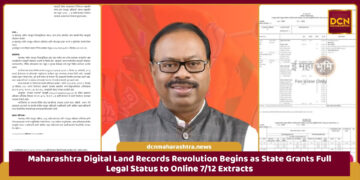Special Correspondent
Pune : In a significant move aimed at improving traffic management and promoting cashless toll transactions, the Maharashtra cabinet has announced that all vehicles in the state, both private and commercial, will be required to have a FASTag starting April 1, 2025. The decision was made during a recent cabinet meeting led by Chief Minister Devendra Fadnavis. Alongside this, amendments to the Public-Private Partnership (PPP) Policy of 2014 and revisions to the Maharashtra Government Rules of Business were also approved.
Key Decisions and Updates
Mandatory FASTag for All Vehicles from April 2025 From April 1, 2025, all vehicles in Maharashtra using national highways will be required to have a FASTag. This initiative is expected to help reduce traffic congestion, streamline toll payments, and boost cashless transactions, ultimately enhancing road safety and efficiency.
The FASTag system, which was introduced by the central government for electronic toll collection, allows vehicles to pass through toll booths without stopping, making the toll process faster and more efficient. Vehicle owners will need to recharge their FASTag accounts, which are linked to their bank accounts. As per new regulations by the National Highways Authority of India (NHAI), it is now mandatory for FASTag users to update their Know Your Customer (KYC) details. Failing to do so by January 31, 2025, will result in old FASTags being deactivated, forcing drivers to pay double toll fees at toll plazas.
Changes to Public-Private Partnership Policy 2014 The Maharashtra government has approved changes to the Public-Private Partnership (PPP) Policy of 2014, aiming to make government operations more transparent, efficient, and citizen-friendly. These changes are intended to facilitate better public services and infrastructure projects across the state.
Revised Maharashtra Government Rules of Business Amendments to the Maharashtra Government Rules of Business will streamline the functioning of the state administration. The new rules will clarify the roles and responsibilities of the Chief Minister, Ministers, Ministers of State, and the Cabinet. Additionally, procedures for presenting bills in the legislature and defining the duties of administrative officers will be outlined.
Implementation of E-Cabinet System The government will implement an e-Cabinet system, transitioning to paperless cabinet meetings in the future. This will lead to more efficient governance and reduce the use of paper in the decision-making process.
Background on FASTag FASTag is an electronic toll collection system that links vehicles with prepaid accounts, allowing for swift toll payments on national highways. While motorcycles and three-wheelers are not required to have FASTags, the “One Vehicle, One FASTag” policy ensures that each vehicle is assigned a unique FASTag. It is now mandatory to complete KYC to ensure uninterrupted use of the FASTag system.
These progressive measures taken by the Maharashtra government reflect a strong commitment to improving infrastructure, promoting digital payments, and making governance more transparent and efficient for the state’s residents.
















